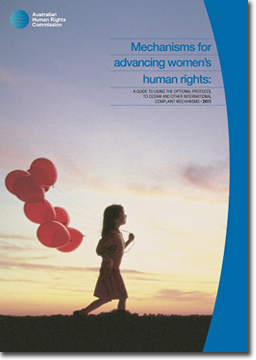Mechanisms for advancing women’s human rights
A guide to using the Optional Protocol to CEDAW and other international complaint mechanisms

This is a practical guide for lawyers, advocates and women experiencing violations of their rights on how to use the Optional Protocol to CEDAW and other international complaint mechanisms to seek redress for alleged violations of women's human rights.
 Download in Word [1.36 MB]
Download in Word [1.36 MB] Download in PDF [846 KB]
Download in PDF [846 KB]- Optional Protocol to the CEDAW blog
Foreword
In my role as Sex Discrimination Commissioner, I have been working together with the Australian Government, business, unions and community groups to identify practical ways of achieving gender equality in Australia.
Australia’s accession to the Optional Protocol to the Convention on the Elimination of All Forms of Discrimination against Women in 2008 offers a new way in which women’s human rights can be advanced.
Australia has a strong system of law and strong processes for the protection of women’s rights. However, it is not perfect and gaps do exist. Gaps exist in a variety of areas covered by the Sex Discrimination Act 1984 including superannuation, sport, provisions of goods and services, and in employment. These gaps exist not only in the coverage of legislation but sometimes in the manner in which the legislation is enforced. The Optional Protocol provides a possible means for redressing such gaps.
An Optional Protocol enables individuals or groups of individuals to seek redress for violations of their human rights that are recognised in an international human rights treaty. An international complaint mechanism can be effective in drawing international attention to alleged violations of rights. The availability of the Optional Protocol to individuals within Australia provides a strong impetus to use international mechanisms to correct discrepancies and failings within our current domestic legal system. It has moved Australia one step closer to eliminating discrimination against women.
The guide provides lawyers, advocates and women experiencing violations of their rights with an introduction and a practical guide on how to use the Optional Protocol to CEDAW and other alternative protective mechanisms at the international level. This guide is an important educative tool for progressing gender equality in Australia.
Elizabeth Broderick
Sex Discrimination Commissioner
Australian Human Rights Commission
June 2011



